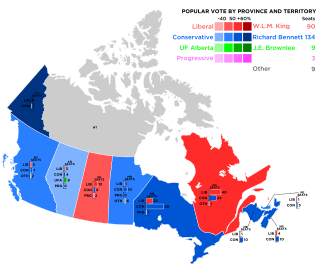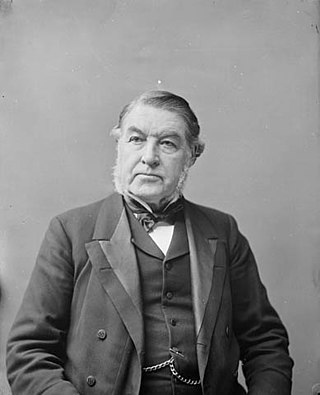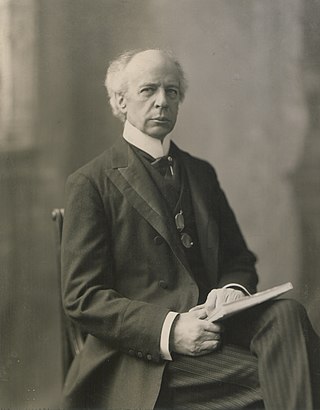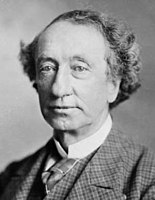
The Pacific Scandal was a political scandal in Canada involving large sums of money being paid by private interests to the Conservative government to cover election expenses in the 1872 Canadian federal election, to influence the bidding for a national rail contract. As part of British Columbia's 1871 agreement to join the Canadian Confederation, the federal government had agreed to build a transcontinental railway linking the seaboard of British Columbia to the eastern provinces.

The 1867 Canadian federal election was held from August 7 to September 20, 1867, and was the first election for the new country of Canada. It was held to elect members representing electoral districts in the provinces of Nova Scotia, New Brunswick, Ontario and Quebec to the House of Commons of the 1st Canadian Parliament. The provinces of Manitoba (1870) and British Columbia (1871) were created during the term of the 1st Parliament of Canada and were not part of this election.

The 1896 Canadian federal election was held on June 23, 1896, to elect members of the House of Commons of Canada of the 8th Parliament of Canada. Though the Conservative Party, led by Prime Minister Charles Tupper, won a plurality of the popular vote, the Liberal Party, led by Wilfrid Laurier, won the majority of seats to form the next government. The election ended 18 years of Conservative rule.

The 1872 Canadian federal election was held from July 20 to October 12, 1872, to elect members of the House of Commons of Canada of the 2nd Parliament of Canada. Prime Minister Sir John A. Macdonald's Conservative Party remained in power, defeating the Liberals. However, the Liberals increased their parliamentary representation considerably, while the Conservative seat count remained static, giving them only six more seats than the Liberals. The election produced the country's first minority government. The support of two independent Conservative MPs functionally gave Macdonald an extremely slim majority that allowed it to survive for two years, until it fell due to scandal.

Sir Hugh John Macdonald, was the only surviving son of the first prime minister of Canada, John A. Macdonald. He too was a politician, serving as a member of the House of Commons of Canada and a federal cabinet minister, and briefly as the eighth premier of Manitoba.

The 1891 Canadian federal election was held on March 5, 1891, to elect members of the House of Commons of Canada of the 7th Parliament of Canada. It was won by the Conservative Party of Prime Minister Sir John A. Macdonald.

The 1874 Canadian federal election was held on January 22, 1874, to elect members of the House of Commons of Canada of the 3rd Parliament of Canada. Sir John A. Macdonald, who had recently been forced out of office as prime minister, and his Conservatives were defeated by the Liberal Party under their new leader Prime Minister Alexander Mackenzie.

The 1935 Canadian federal election was held on October 14, 1935, to elect members of the House of Commons of Canada of the 18th Parliament of Canada. The Liberal Party of William Lyon Mackenzie King won a majority government, defeating Prime Minister R. B. Bennett's Conservatives.

Joseph-Édouard Cauchon, was a prominent Quebec politician in the middle years of the nineteenth-century. Although he held a variety of portfolios at the federal, provincial and municipal levels, he never achieved his goal of becoming the Premier of Quebec.

The 1930 Canadian federal election was held on July 28, 1930, to elect members of the House of Commons of the 17th Parliament of Canada. Richard Bedford Bennett's Conservative Party won a majority government, defeating the Liberal Party led by Prime Minister William Lyon Mackenzie King.

The 1926 Canadian federal election was held on September 14, 1926, to elect members of the House of Commons of Canada of the 16th Parliament of Canada. The election was called after an event known as the King–Byng affair.

The 1882 Canadian federal election was held on June 20, 1882, to elect members of the House of Commons of Canada of the 5th Parliament of Canada.

The 1887 Canadian federal election was held on February 22, 1887, to elect members of the House of Commons of Canada of the 6th Parliament of Canada.
John Frederick Johnston was a Saskatchewan politician.

This article is the Electoral history of Sir John A. Macdonald, the first Prime Minister of Canada.

This article is the Electoral history of Alexander Mackenzie, the second Prime Minister of Canada. A Liberal, he served one term as Prime Minister. He became Prime Minister after defeating the government of Sir John A. Macdonald on a non-confidence motion in 1873 and then winning the general election of 1874. He later lost the general election of 1878 and Macdonald returned to power.

This article is the Electoral history of Sir Mackenzie Bowell, the fifth Prime Minister of Canada. A Conservative, he became prime minister upon the sudden death in office of Prime Minister Sir John Thompson in 1894. Bowell served a short term of just over one year as prime minister (1894-1896), until he was forced to resign over the Manitoba Schools Question. He never led his party in a general election. When he died in 1917, he was one of the last surviving members of the first House of Commons of Canada elected in 1867.

This article is the Electoral history of Sir Charles Tupper, the sixth Prime Minister of Canada. A Conservative, he became prime minister upon the resignation of Prime Minister Sir Mackenzie Bowell over the Manitoba Schools Question in 1896. Tupper was the shortest-serving prime minister, with a term of only 69 days. He led his party in two general elections and lost both, to Sir Wilfrid Laurier

This article is the Electoral history of Sir Wilfrid Laurier, the seventh Prime Minister of Canada.




















